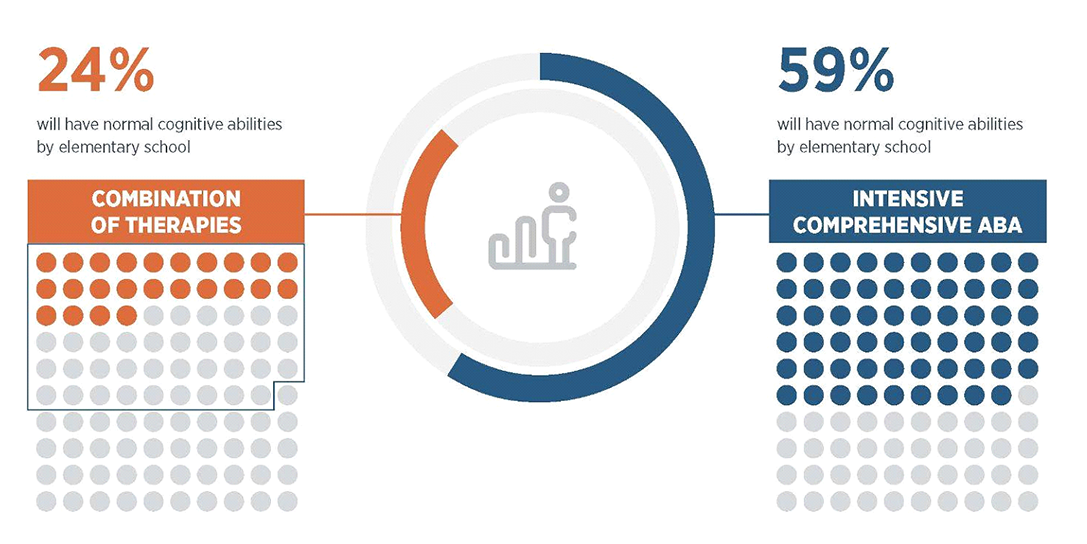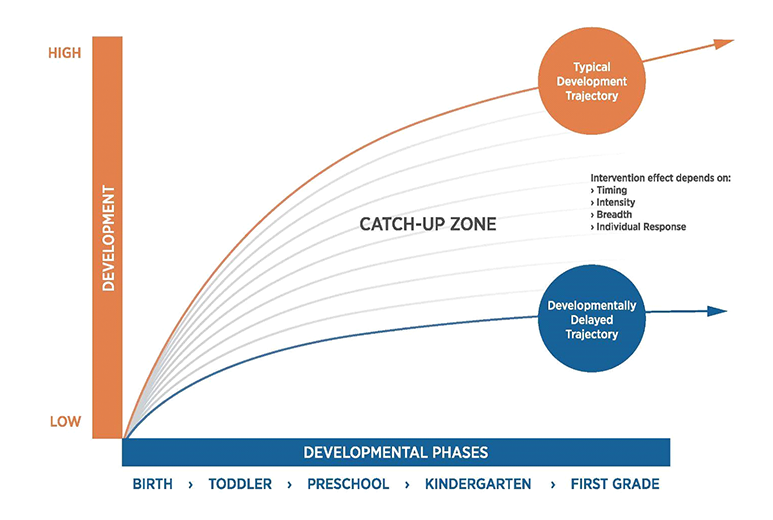Learn about treatment for autism in toddlers in our Readiness Program specially designed for children 12 months to three years old.
If your child is three years or older, learn more about early childhood autism services in our Foundations program.
We can answer any questions you have, from “Does early intervention work for autism?” to “How does communication early intervention fit into ABA therapy?”
Please Contact Us to get started today.
What is early intervention?
“Early intervention” describes the services available to infants, toddlers, and preschoolers with autism. The goal of early childhood intervention is to lessen the effects or symptoms of autism that would likely impact the child’s development and learning ability.
The “early” in early intervention is crucial. Young children (ages 0-6) have billions more neurons and synapses than they will at any other age, which means it’s easier for them to learn when they’re little.

Early Intervention and Treatment Outcomes

Intensive ABA therapy yields more promising results than eclectic treatment (intensive or non-intensive combination of therapies). When treatment is intensive, long in duration, and delivered directly to children rather than to caregivers, children are more likely to develop alongside their peers and achieve normal cognitive abilities by the time they enter elementary school.

The earlier a child begins treatment, the higher their chances of catching up to their peers and eventually leading independent lives.
Early Intervention and Autism

Early intervention with Applied Behavior Analysis (ABA) therapy does not “cure” or “remove” autism; it’s a way for children to move beyond the barriers that may otherwise have kept them from leading a more fulfilling life.
Whether your child is already diagnosed or not, it’s important to intervene and call a licensed professional as soon as you notice symptoms. Therapeutic Pathways offers some of the best early intervention services in California, and we’re happy to facilitate the insurance process for you. You won’t have to ask if Medi-Cal covers ABA therapy in California - you’ll already know that it’s taken care of.
Close the Gap
Early Intervention ABA
If early intervention is the “when” in autism treatment, ABA therapy is the “how.” Applied Behavior Analysis, also known as ABA, is a type of therapy geared toward individuals with autism and other developmental disorders.
Based on the scientific principles of behavior analysis, ABA develops specific, functional behaviors to help children with autism live safer, more fulfilling lives. At the same time, ABA helps reduce dangerous or maladaptive behaviors that are often present in children with autism (self injury, tantrums, etc.).
How does ABA work in early intervention?
ABA is all about building skills. At Therapeutic Pathways, BCBA Clinical Supervisors are in charge of studying childrens’ specific behaviors, identifying their interests and motivators, and coming up with a plan to address needs based on individual goals.
In this way, each child’s treatment team helps them develop social, emotional, communication and daily living skills while reducing undesirable or dangerous behaviors.


Learn about the different techniques in ABA therapy and what it can do to help your child. >>
Early Intervention Services in California
Sooner is Better. Get Started Today.
Young children with autism are developmentally delayed in several areas, including language, play, self-awareness, socialization, and cognition. Both of our programs for young children work to establish and strengthen these areas as part of early childhood intervention in California.
Our integrated approach is built on data and evidence. The latest findings in the field of speech and language pathology are integrated into every interaction to ensure that your child receives the best early intervention with integrated speech therapy in California.
We offer two ABA early intervention programs at Therapeutic Pathways. Designed for infants and toddlers ages 0-3, Readiness teaches fundamental skills including imitation and engagement through fun, child-centered activities.
Designed for children in early childhood with autism (ages 3-7), Foundations provides children with the structure and support to achieve social, emotional, and intellectual milestones.
 Listen to Our Podcast
Listen to Our Podcast

